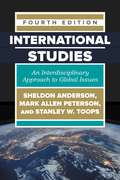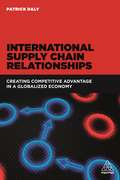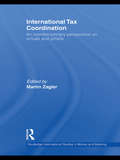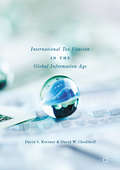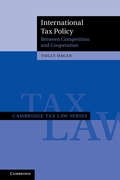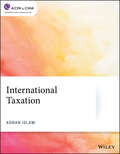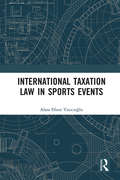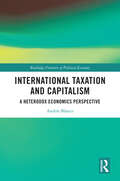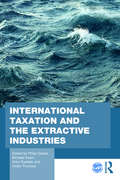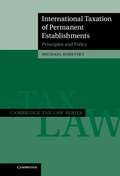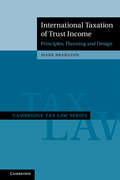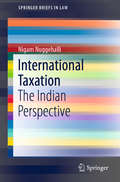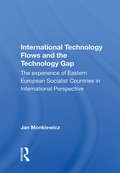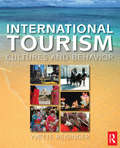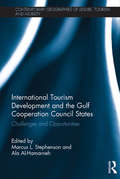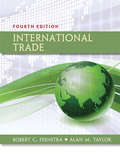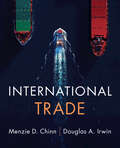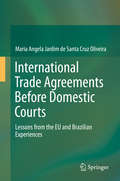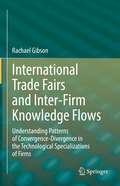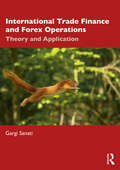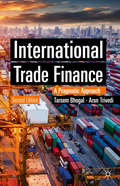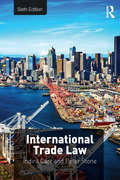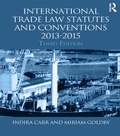- Table View
- List View
International Studies: An Interdisciplinary Approach to Global Issues
by Sheldon Anderson Mark Allen Peterson Stanley W. ToopsThis core text is the first to provide a much-needed interdisciplinary approach to international studies. Emphasizing the interconnected nature of history, geography, anthropology, economics, and political science, International Studies details the methodologies and subject matter of each discipline then applies these discipline lenses to seven regions: Europe; East Asia and the Pacific; South and Central Asia; sub-Saharan Africa; the Middle East and North Africa; Latin America; and North America. This disciplinary and regional combination provides an indispensable, cohesive framework for understanding global issues. The fully updated fourth edition includes four new global issues chapters: The Refugee Crisis in Europe; The Syrian Civil War and the Rise of the Islamic State; Global Climate Change; and The Globalization of Modern Sports.
International Supply Chain Relationships: Creating Competitive Advantage in a Globalized Economy
by Patrick DalyMultinational corporations have developed networks of production that stretch across the globe. They have done this in order to maximize their ability to service their customers in markets worldwide, exploit greater opportunities for growth, maximize their profitability and increase their business value. It is the strength and quality of the relationships and connections that we build with other players that will ultimately determine the effectiveness and the success of our business. International Supply Chain Relationships looks at these complex connections, covering long-term inter-organizational relationships, situational inter-organizational relationships, multi-disciplinary global engineering teams, technologies and innovations, supply chain communication, supply chain coordination, and future trends.International Supply Chain Relationships aims to provide supply chain practitioners in any type of business with ideas, tools and strategies that they can readily access, interpret and put into practice speedily and pragmatically to create value for their own international business. In many instances, supply chain projects bring together people from different disciplines who may come from different cultures and ethnic backgrounds. Add in long distances and different time zones and the complexities and challenges of sustaining successful working relationships increase even more. This book provides case studies which illustrate how to manage these arrangements effectively.
International Tax Coordination: An Interdisciplinary Perspective on Virtues and Pitfalls (Routledge International Studies In Money And Banking Ser. #60)
by Martin ZaglerInternational taxation is a major research topic, and for a field of research at the intersection of so many disciplines there has been surprisingly little done across disciplinary boundaries. This book fills the gap by combining teams from business, economics, information science, law and political science to offer a unique and innovative approach to the issue of international tax coordination. All the chapters are written in collaboration between at least two authors from two different disciplines. This approach offers a rich and nuanced understanding of the many issues of international tax coordination. The book collects seven papers, each one a valuable contribution in itself, beginning with current problems of international taxation and finishing with potential solutions. The essays explore current EU legislation, tax avoidance and tax fraud, as well as double tax agreements, dividend repatriation and hybrid finance and tax planning. Providing methodological answers to the question of how to conduct interdisciplinary research, the book also gives an accessible introduction into research questions and answers that are important in related disciplines for scholars in various areas. This book will be of interest to postgraduates and researchers in the fields of economics, business, informational science, law and political science, as well as to professional accountants and tax lawyers.
International Tax Evasion in the Global Information Age
by David S. Kerzner David W. ChodikoffThis book provides a comprehensive analysis of the Organisation for Economic Cooperation and Development's (OECD) war on offshore tax evasion. The authors explain the new emerging regulatory regimes on the global exchange of information to combat offshore tax evasion and analyse why Automatic Exchange of Information (AEOI) is not a "magic bullet" solution. Chapters include coverage of the Foreign Account Tax Compliance Act (FATCA), AEOI and the Common Reporting Standards (CRS), and the unprecedented extra-territorial enforcement by the United States of its tax and reporting laws, including the FBAR provisions of the Bank Secrecy Act. These new legal regimes directly impact nearly all financial institutions and financial service providers in the U. S. , U. K. , EU, Canada, and each of the 132 member jurisdictions of the OECD's Global Forum, as well as 8 million U. S. expats. In light of The Panama Papers, this book offers a timely and valuable contribution on the prevalence and costs of international tax evasion for the global financial community, policy-makers, and practitioners alike.
International Tax Policy: Between Competition and Cooperation (Cambridge Tax Law Series)
by Tsilly DaganBringing a unique voice to international taxation, this book argues against the conventional support of multilateral co-operation in favour of structured competition as a way to promote both justice and efficiency in international tax policy. Tsilly Dagan analyses international taxation as a decentralised market, where governments have increasingly become strategic actors. While many of the challenges of the current international tax regime derive from this decentralised competitive structure, Dagan argues that curtailing competition through centralisation is not necessarily the answer. Conversely, competition - if properly calibrated and notwithstanding its dubious reputation - is conducive, rather than detrimental, to both efficiency and global justice. International Tax Policy begins with the basic normative goals of income taxation, explaining how competition transforms them and analysing the strategic game states play on the bilateral and multilateral level. It then considers the costs and benefits of co-operation and competition in terms of efficiency and justice. A non-technical account of tax policy in an increasingly globalised era appealing to those interested in international tax law and related issues. A theoretical analysis of international tax policy that provides a necessary foundation for current debates on substantial changes in international tax policy. Offers an integrated multidisciplinary framework for evaluating competing international tax regimes in a global setting.
International Taxation (AICPA)
by Adnan IslamWhether your organization is contemplating a global move or is already involved in international business, you need to know about the activities that create multi-jurisdictional tax exposure and the required tax reporting for each relevant jurisdiction. Information is provided for Tax Reform and the impact of the Tax Cuts and Jobs Act of 2017, this guide covers international tax terminology and regulations that apply to a U.S. entity involved in global operations, or for a foreign entity doing business in the United States. Key topics include: Export income Receipts in foreign currency Allocation and apportionment of deductions U.S. foreign tax credit fundamentals and special rules Initiation of foreign operations Foreign branches and affiliated companies Sale of use of tangible property Foreign business operations in the United States Foreign business sales of tangible property in the United States Foreign business provision of services in the United States Exploitation of business assets outside of the United States Use of foreign tangible/intangible property in the United States U.S. withholding taxes on foreign businesses FDII GILTI
International Taxation Law in Sports Events: An Income Tax Analysis
by Alara Efsun YazıcıoğluThis book is the first academic contribution that deals with international taxation of income sources from sports events.Using an interdisciplinary approach, with in-depth analysis of both sports law and international tax law, it is notably the first academic work to conduct a thorough analysis in the fields of international taxation of eSports, sports betting as well as illegal/unlawful income sources that may be obtained in relation to a sporting event, such as kickback payments. After describing the general methodologies of income tax and VAT from an international standpoint, defining key terms such as ‘eSports’ and ‘bidding procedure’, the book examines in detail the taxation of the services that are rendered and the goods that are sold, thereby the income obtained, in relation to an international sports event from both income tax and VAT perspectives. Also analysed are government funding in the sports sector, along with its taxation modalities, as well as specific tax exemption regulations enacted for the purposes of mega sporting events. Highlighting the absence of an acceptable level of certainty in the field of taxation of international sports events, the work makes pertinent suggestions as to the future of international sporting event taxation law.With international appeal, this comprehensive book constitutes essential reading for tax and sports law scholars.
International Taxation and Capitalism: A Heterodox Economics Perspective (Routledge Frontiers of Political Economy)
by Andrés BlancoThe book introduces a novel approach to international taxation through the lens of heterodox economic and social theories, in particular Marxism.The book argues that the radical reorganization of the international tax system that has been underway for the last few decades – initiated by the OECD, and furthered by the G20 and the European Union – is a response to changes in the global structure of capitalism, especially in terms of “center-periphery”. Through both normative analysis and empirical evidence, the book shows that the global tax system emerging from these changes consolidates the regulatory and tax revenue control of the central states. It also demonstrates that this consolidation and centralisation is designed to enable the dominance of multinational corporations in the global economy. This path of international taxation is explained in the book through certain general concepts of Marxian economic theory, such as the accumulation of capital and the tendency of the rate of profit to fall, along with other specific developments, such as the unequal participation of the different regions of the world in the capitalist system and a general theory of money that incorporates elements proposed by some sectors of post-Keynesianism.This book is invaluable reading for anyone interested in global capitalism, the financial system, heterodox economics, and Marxist theory.
International Taxation and the Extractive Industries: Resources without Borders (Routledge Studies in Development Economics)
by Michael Keen Victor Thuronyi Philip Daniel Artur ŚwistakThe taxation of extractive industries exploiting oil, gas, or minerals is usually treated as a sovereign, national policy and administration issue. This book offers a uniquely comprehensive overview of the theory and practice involved in designing policies on the international aspects of fiscal regimes for these industries, with a particular focus on developing and emerging economies. <P><P>International Taxation and the Extractive Industries addresses key topics that are not frequently covered in the literature, such as the geo-political implications of cross-border pipelines and the legal implications of mining contracts and regional financial obligations. The contributors, all of whom are leading researchers with experience of working with governments and companies on these issues, present an authoritative collection of chapters. The volume reviews international tax rules, covering both developments in the G20-OECD project on ’Base Erosion and Profit Shifting’ and more radical proposals, identifying core challenges in the extractives sector. <P><P>This book should become a core resource for both scholars and practitioners. It will also appeal to those interested in international tax issues more widely and those who study environmental economics, macroeconomics and development economics.
International Taxation of Permanent Establishments
by Michael KobetskyThe effects of the growth of multinational enterprises and globalization in the past fifty years have been profound, and many multinational enterprises, such as international banks, now operate around the world through branches known as permanent establishments. The business profits article (Article 7) of the OECD model tax treaty attributes a multinational enterprise's business profits to a permanent establishment in a host country for tax purposes. Michael Kobetsky analyses the principles for allocating the profits of multinational enterprises to permanent establishments under this article, explains the shortcomings of the current arm's length principle for attributing business profits to permanent establishments and considers the alternative method of formulary apportionment for allocating business profits.
International Taxation of Trust Income: Principles, Planning and Design (Cambridge Tax Law Series)
by Mark BrabazonIn International Taxation of Trust Income, Mark Brabazon establishes the study of international taxation of trust income as a globally coherent subject. Covering the international tax settings of Australia, New Zealand, the UK, and the US, and their taxation of grantors/settlors, beneficiaries, trusts, and trust distributions, the book identifies a set of principles and corresponding tax settings that countries may apply to cross-border income derived by, through, or from a trust. It also identifies international mismatches between tax settings and purely domestic design irregularities that cause anomalous double- or non-taxation, and proposes an approach to tax design that recognises the policy functions (including anti-avoidance) of particular rules, the relative priority of different tax claims, the fiscal sovereignty of each country, and the respective roles of national laws and tax treaties. Finally, the book includes consideration of BEPS reforms, including the transparent entity clause of the OECD Model Tax Treaty.
International Taxation: The Indian Perspective (SpringerBriefs in Law)
by Nigam NuggehalliThis book covers all major topics in international tax law, ranging from permanent establishments and capital gains to the taxation of royalties and technical services, transfer pricing, and General Anti-Avoidance Legislation. It also highlights the Indian “story” of status vs. contract by examining four areas of controversy: permanent establishments, FTS (Fees for Technical Services) & Royalty, capital gains, and transfer pricing. The book approaches the subject of international taxation from two opposing yet related perspectives. One is the tax planning perspective, which involves contracts entered into by individuals and companies; the other is that of state regulation through increasingly complex legislation.The area of permanent establishments demonstrates the dominance of contracts over status, at least with respect to Indian tax law. However, some recent judicial decisions in this area demonstrate the susceptibility of contracts to status-related arguments. The areas of FTS & Royalty as well as those of capital gains and transfer pricing demonstrate the Indian government’s attempts to establish, through legislation, the dominance of status over contracts.Whereas traditional textbooks on international tax law focus on the legal technicalities of tax legislation, this book provides tax scholars and lawyers with an understanding of tax planning and tax legislation side by side in each chapter, specifying the respective kind of actual or anticipated tax planning activity that in turn prompted a legislative response. As such, it offers readers a contextual and practical introduction to the complexities of international tax law, as well as an in-depth analysis of the latest debates and controversies in this area.
International Technology Flows And The Technology Gap: The Experience Of Eastern European Socialist Countries In International Perspective
by Jan MonkiewiczThis book assesses under what conditions and to what extent international technology transfer may contribute to technology gap closure in overall industrial activity. It is of particular interest for all developing countries as well as for the socialist countries of Eastern Europe.
International Tourism
by Yvette Reisinger Frederic DimancheIn recent years there has been a considerable interest in the cultural aspects of tourism such as the impacts of culture on tourism planning, development, management, and marketing. However, the focus has been on material forms of culture such as arts, music, or crafts. The impacts of national culture on tourist behavior and travel decision-making have not been paid much attention. Only in the last two years have cross-cultural issues begun to generate significant interest among academics.An examination of cultural characteristics and differences is extremely important to the tourism industry because today’s tourism environment is becoming increasingly international. Information on the nature of the cultural differences between international tourists and locals is not readily available in tourism literature. The concept of culture is very complex and includes such abstract concepts as satisfaction, attitude and loyalty. International Tourism brings these concepts to the undergraduate student in tourism, as well as students in the related fields of marketing, management, international business, and cross-cultural communication. Designed as a textbook, it isorganized and presented in an integrated and relevant way for the benefit of a worldwide audience.
International Tourism Development and the Gulf Cooperation Council States: Challenges and Opportunities (Contemporary Geographies of Leisure, Tourism and Mobility)
by Marcus L. Stephenson Ala Al-HamarnehThis book examines the challenges facing the development of tourism in the six member states of the Gulf Cooperation Council (GCC): Bahrain, Kuwait, Oman, Qatar, Saudi Arabia and the United Arab Emirates (UAE). This region, which largely comprises the Arabian Peninsula, possesses some of the fastest growing economies in the world and is remarkably unique. It shares similar associations and affinities: tribal histories, royal kinship, political associations, Bedu cultural roots, Islamic heritage, rapid urbanization, oil wealth, rentier dynamics, state capitalist structures, migrant labour, economic diversification policies and institutional restructuring. Therefore, this volume takes the study of tourism away from its normative unit of analysis, where tourism in the region is being examined within the context of the Middle East and the wider Islamic and Arab world, towards an enquiry focusing on a specific geo-political territory and socially defined region. Although international tourism development in the region embodies a range of challenges, complexities and conflicts, which are deeply contextualized in this volume, the approach overall does not endorse the normative ‘Gulf bashing’ position that has predominated within the critical enquiries in the region. It presents a forward-looking and realistic assessment of international tourism development, examining development potentialities and constructive ways forward for GCC states and the region as a whole. This edited volume provides a real attempt to examine critically ways in which tourism and its development intersect with the socio-cultural, economic, political, environmental and industrial change that is taking place in the region. By doing so, the book provides a theoretically engaged analysis of the social transformations and discourses that shape our contemporary understanding of tourism development within the GCC region. Moreover, it deciphers tourism development’s role within the context of the GCC states undergoing rapid transformation, urbanization, ultra-modernization, internationalization and globalization. In addition to state-specific illustrations and destination case studies, the work provides insights into relatable themes associated with international tourism development in the region, such as tourism’s relationship with religion, heritage and identity, the environment and sustainability, mobility and cross-border movements, the transport industry, image production and destination branding, mega-development and political stability and instability. The book combines theory with diverse case study illustrations, drawing on disciplinary knowledge from such fields as sociology, political economy and social geography. This timely and original contribution is essential reading for students, researchers and academics in the field of tourism studies and related subject areas, along with those who have regional interests in Middle East studies, including Gulf and Arabian Peninsula studies.
International Trade
by Robert C. Feenstra Alan M. TaylorDeveloped in the classroom by two of the most prominent researchers in the field, Feenstra and Taylor’s International Economics uses engaging applications to provide a modern view of the global economy for a modern audience. Most international economics textbooks emphasize theory and the economies of advanced countries. Feenstra and Taylor combine theoretical coverage with empirical evidence throughout, while reflecting the realities of the global economy by covering emerging markets and developing countries (India, China, Southeast Asia). The new edition has been thoroughly updated to include new data and Applications, as well as many new Headlines to reflect the rapid changes in international economics during the last three years. The 4th Edition includes the latest on opening relations with Cuba, immigration and Europe’s refugee crisis, the effect of NAFTA on wages and employment, job polarization, quicksourcing, China’s problems, and the debate in Britain about leaving the European Union.
International Trade
by Menzie D. Chinn Douglas A. IrwinUnderstanding the globalized world economy is more important than ever before. This book provides a clear, concise, and up-to-date look at the economic foundations of international trade. The authors explain the principal concepts in an engaging and accessible manner open to students from any discipline, incorporating contemporary trade data through full-colour diagrams and graphs. Throughout, economic models are discussed in the context of recent and current international trade issues, to ensure students gain a concrete understanding and see how the field impacts the real world. Written for upper undergraduate courses, the book includes feature boxes that marry theory and economics in practice to show models applied, a featured real-world application for every chapter, and over 100 end-of-chapter questions help students fully engage with and consolidate their learning. Online resources for instructors include a solutions manual, lecture slides and the book figures as JPEGs.
International Trade Agreements Before Domestic Courts
by Maria Angela Jardim de Santa Cruz OliveiraThis book addresses the role of domestic courts in the enforcement of international trade agreements by examining the experiences of Brazilian and the European Union courts. This comparative study analyzes the differences, similarities and consequences of Brazilian and European courts' decisions in relation to the WTO agreements, which have "direct effect" in Latin American emerging economies, but not in the European Union or other developed countries. It observes that domestic courts' enforcement of international trade agreements has had several unintended and counterproductive consequences, which were foreseeable in light of international scholarly debate on the direct effect of WTO agreements. It draws lessons from these jurisdictions' experiences and argues that the traditional academic literature that fosters domestic courts' enforcement of international law should be reconsidered in Latin America in relation to international trade agreements. This book defends the view that, as a result of their function and objectives together with the principles of popular sovereignty and democratic self-government, international trade agreements should not be considered to be self-executing or to have direct effect. This empirical work will be valuable to anyone interested in the effects of international trade rules at the domestic level and the role of domestic judges in international law.
International Trade Disputes and EU Liability
by Anne ThiesThe European Union has become the respondent of several international trade disputes. This book examines the right to compensation for damage resulting from retaliatory measures imposed under the system of the World Trade Organization in disputes triggered by the EU. Anne Thies evaluates the implications of the EU's membership in the WTO for its domestic system of rights and judicial protection. Emphasising the necessity to maintain EU standards of protection independently of the external dimension of EU action, the book offers suggestions on how the current gap of protection could be filled while upholding the scope of manoeuvre of the EU institutions on the international plane. Moreover, it places the issue in its broader context of the relationship between international and EU law on the one hand, and the discretion of the EU as a global actor and standards of individual rights protection under EU law on the other.
International Trade Fairs and Inter-Firm Knowledge Flows: Understanding Patterns of Convergence-Divergence in the Technological Specializations of Firms
by Rachael GibsonAgainst a backdrop of economic uncertainty caused by a shift toward protectionism and the COVID-19 pandemic among other issues, this book suggests that international trade fairs (ITFs) represent a vital source of economic dynamism that can support national and regional economies by creating opportunities for firms to access new markets, network with key actors in their industry or value chain, and tap into valuable external knowledge flows regarding new technologies and innovations. Author Rachael Gibson argues that ITFs have become crucial nodes in the global political economy, driving global economic dynamics and mediating differences between capitalist economies regarding their technological and institutional practices and conditions. In this way, ITFs represent a decisive mechanism by which distinct national patterns of technological specialization may converge or diverge.Trade fairs represent important platforms for networking, interactive learning, and knowledge exchange because they foster intense interactions among actors despite spatial boundaries. ITFs also tend to be organized according to a specific technological or industry focus, which means that they can facilitate interactions between firms from different capitalist varieties. Through the diffusion of state-of-the-art knowledge, ITFs may, thus, serve as drivers of economic globalization, challenging the continuation of distinct capitalist varieties by enabling cross-system convergence regarding the technological specializations of firms. Yet, it is clear that countries have retained competitive advantages in specific industries and that full convergence has not taken place. This book explores this puzzle.
International Trade Finance and Forex Operations: Theory and Application
by Gargi SanatiThis book bridges the existing gap between the theory and practices related to international finance. It discusses banking theories and operational procedures relating to the methods of payment with special reference to Letters of credit (LCs), like revolving LCs, back-to-back LCs, transferable LCs, and standby LCs, with specific applications of documentary discrepancies. Moreover, this book discusses merchanting trade, buyers’ credit and supplier’s credit, and bank guarantees with many practical caselets, linked to the applications of the International Chamber of Commerce (ICC) and other regulatory rules. It also examines the various roles of banks in financing international trade which are extensively discussed through several cases.This volume: Explains in-depth the intricacies and discrepancies relating to the documentation involved in international trade Presents in detail the various steps of executing an export or import deal, right from signing of the contract, managing pre-shipment credit, and booking a forward contract to hedge the exchange rate risk till the closing of the deal Gives a comprehensive account of all trade finance products with processes and procedures, rules, and regulations, and risks and mitigates Discusses the application of ICC rules through detailed case-lets, which helps an exporter take necessary actions when the payment is denied by a party overseas, or how an importer can simply deny the payment if there is documentary noncompliance Scrutinises different types of forex transactions, the regulatory framework within which they take place, and the associated risks and solutions Attempts to resolve the existing disparity in the understanding and interpretation of regulatory guidelines and the practices adopted by banks and corporate houses in implementing them. Accessibly written, this book will be useful to students, researchers, and teachers from the fields of management, business studies, international trade and treasury operations, finance, international banking, trade and commerce, and economics. This will also be an invaluable companion to the professionals working in export–import businesses, foreign exchange businesses, treasury front-office and back-office operations, bureaucrats, and public policymakers.
International Trade Finance: A Pragmatic Approach (Finance and Capital Markets Series)
by Tarsem Bhogal Arun TrivediThe 21st century has witnessed swift change in every sphere of the human endeavour. Regulatory re-alignment, digitalisation and economic and political developments have contributed to paradigm shift in banking, trade, finance and the shipping industry virtually transforming the landscape. International Trade Finance is an essential tool for bankers, exporters/importers, shippers, consultants, teachers and students navigating the procedures of international trade finance. The book addresses basic topics relating to international trade including letters of credit mechanism, collections of bills, trade customs and practice. New to this revised edition, it covers SWIFT updates, supply chain system, UKEF, Blockchain technologies, the implications of BREXIT, NAFTA, Mexico, Canada and other bilateral agreements and their implications, the US sanctions, terrorist financing and anti-money laundering provisions, and a check list to control financial crime risks in trade finance. The extended metaphor of the book is that of an arm chair tour covering fundamentals to the nuances of the hard core of the subject matter and enabling the readers to deal with complicated implementation issues in a forthright and comprehensive fashion.
International Trade Law
by Peter Stone Indira CarrInternational Trade Law offers a clear overview of the complexities of an international sale transaction through informed analysis of case law, legislation, and international conventions and rules. Fully updated with changes to the law and new directions in legal debate, this new edition considers: * Standard trade terms including INCOTERMS 2010, the Convention on International Sales of Goods 1980 and the UNIDROIT Principles for International Commercial Contracts 2004 * E-Commerce issues, including electronic bills of lading * Insurance and payment mechanisms, such as letters of credit and the UCP 600 * International transportation of cargo, including the Rotterdam Rules * Dispute resolution, incorporating jurisdiction, applicable law, arbitration and mediation * Corruption and anti-corruption conventions, including the UK Bribery Act 2010 In addition to clarifying a range of topics through tables and diagrams, the book directs readers to relevant further reading and online resources throughout, offering students an accessible resource to this often challenging area of the law.
International Trade Law (Routledge-cavendish Core Statutes Ser.)
by Peter Stone Indira CarrInternational Trade Law offers a clear overview of the complexities of an international sale transaction through informed analysis of case law, legislation, and international conventions and rules. Fully updated with changes to the law and new directions in legal debate, this new edition considers: Standard trade terms including INCOTERMS 2010, the Convention on International Sales of Goods 1980 and the UNIDROIT Principles for International Commercial Contracts E-Commerce issues, including electronic bills of lading Insurance and payment mechanisms, such as letters of credit and the UCP 600 International transportation of cargo, including the Rotterdam Rules Dispute resolution (including jurisdiction, applicable law, arbitration and mediation), with particular reference to the relevant EU regulations and the developing case-law thereon Corruption and anti-corruption conventions, including the UK Bribery Act 2010 and developments relating to deferred prosecution agreements In addition to clarifying a range of topics through tables and diagrams, the book directs readers to relevant further reading and online resources throughout, offering students an accessible resource to this often challenging area of the law.
International Trade Law Statutes and Conventions 2013-2015
by Indira Carr Miriam GoldbyThis new edition of International Trade Law Statutes and Conventions presents all the key legislation for international trade law in one student-friendly volume. Developed in response to feedback from lecturers and students, this book is: • Up-to-date with the law: this book provides a fully current and comprehensive collection of legislation • Tailored to course outlines: content has been curated to align with international trade law courses • Exam friendly: conforming to regulations, this is an un-annotated text that is suitable for exam use • Easy to use: a clear and attractive text design, detailed table of contents and multiple indices provides ease of reference and navigation Ideal for course and exam use, as well as for reference, this book is a perfect companion resource to student learning and exam success.
